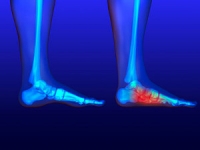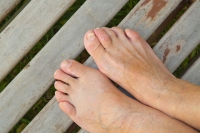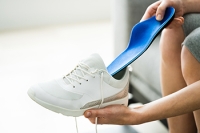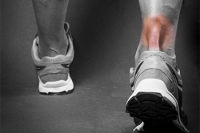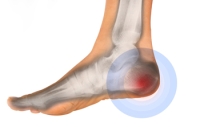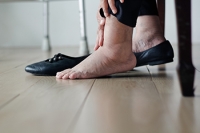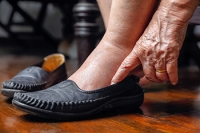
Blog (732)
Are You Suffering From Ingrown Toenails?
Running and Flat Feet
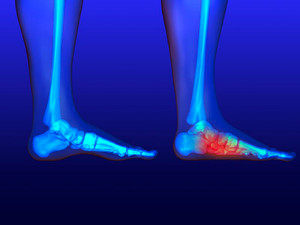
The foot condition that is referred to as flat feet indicates the foot has no arch, or it may be very low. The majority of babies are born with flat feet, which may extend into adulthood as a result of genetics or enduring a foot injury. There are some patients who experience pain with flat feet, and their posture may be affected. People who have flat feet and enjoy running may have to learn specific stretches that can help to strengthen the overall foot before embarking on a run. It is beneficial to stretch the foot before and after every run. This can be done by placing the foot on top of a golf ball and rolling back and forth several times. The Achilles tendon can be stretched by performing appropriate calf stretches. It is beneficial to wear running shoes that are designed for people who have flat feet. These types of shoes may provide adequate arch support in addition to stability, support, and comfort. If you have flat feet and love to run, it is strongly suggested that you confer with a podiatrist who can provide you with information that can protect your feet while running.
Flatfoot is a condition many people suffer from. If you have flat feet, contact Dr. Kenneth Donovan from Advanced Care Foot and Ankle. Our doctor will treat your foot and ankle needs.
What Are Flat Feet?
Flatfoot is a condition in which the arch of the foot is depressed and the sole of the foot is almost completely in contact with the ground. About 20-30% of the population generally has flat feet because their arches never formed during growth.
Conditions & Problems:
Having flat feet makes it difficult to run or walk because of the stress placed on the ankles.
Alignment – The general alignment of your legs can be disrupted, because the ankles move inward which can cause major discomfort.
Knees – If you have complications with your knees, flat feet can be a contributor to arthritis in that area.
Symptoms
- Pain around the heel or arch area
- Trouble standing on the tip toe
- Swelling around the inside of the ankle
- Flat look to one or both feet
- Having your shoes feel uneven when worn
Treatment
If you are experiencing pain and stress on the foot you may weaken the posterior tibial tendon, which runs around the inside of the ankle.
If you have any questions please feel free to contact one of our offices located in Warren, Livingston, and Toms River, NJ . We offer the newest diagnostic and treatment technologies for all your foot and ankle needs.
Hammertoe and Other Conditions
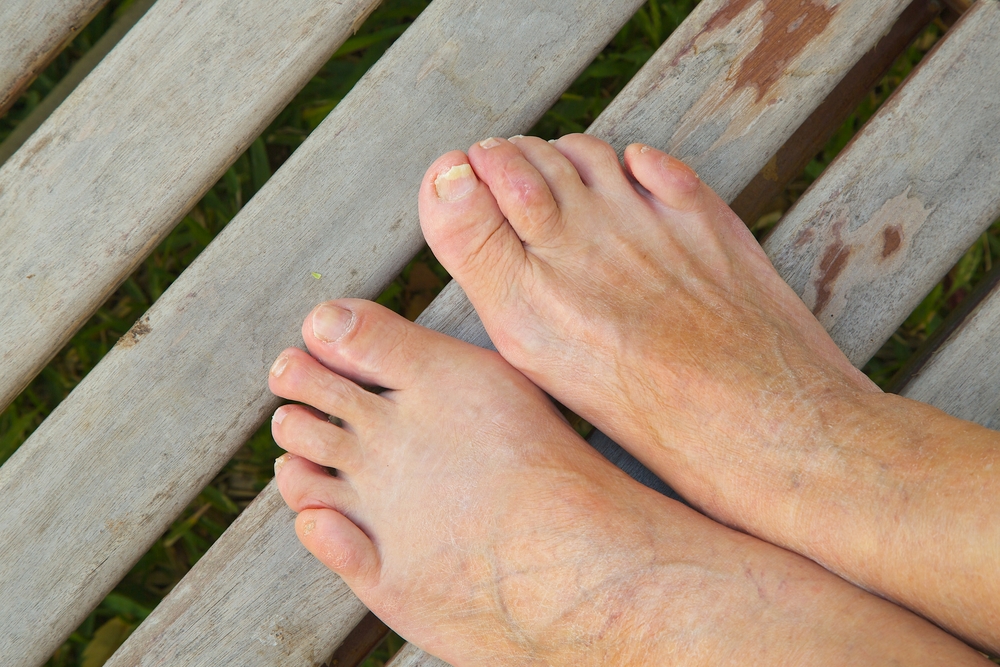
Hammertoe is a particular kind of foot affliction that can occur when the middle of the toe points upward at the joint. Often, this foot condition can be accompanied by other foot conditions. For example, as the middle of the affected toe points upwards, the toe can rub against footwear, making corns more likely to develop. Also, a hammertoe can be associated with bunions, which are bony bumps on the sides of the big toe. If you are someone that is currently struggling with a hammertoe, it is suggested that you schedule an appointment today with a podiatrist who can assess your situation, and offer correct treatment options.
Hammertoe
Hammertoes can be a painful condition to live with. For more information, contact Dr. Kenneth Donovan from Advanced Care Foot and Ankle. Our doctor will answer any of your foot- and ankle-related questions.
Hammertoe is a foot deformity that affects the joints of the second, third, fourth, or fifth toes of your feet. It is a painful foot condition in which these toes curl and arch up, which can often lead to pain when wearing footwear.
Symptoms
- Pain in the affected toes
- Development of corns or calluses due to friction
- Inflammation
- Redness
- Contracture of the toes
Causes
Genetics – People who are genetically predisposed to hammertoe are often more susceptible
Arthritis – Because arthritis affects the joints in your toes, further deformities stemming from arthritis can occur
Trauma – Direct trauma to the toes could potentially lead to hammertoe
Ill-fitting shoes – Undue pressure on the front of the toes from ill-fitting shoes can potentially lead to the development of hammertoe
Treatment
Orthotics – Custom made inserts can be used to help relieve pressure placed on the toes and therefore relieve some of the pain associated with it
Medications – Oral medications such as anti-inflammatories or NSAIDs could be used to treat the pain and inflammation hammertoes causes. Injections of corticosteroids are also sometimes used
Surgery – In more severe cases where the hammertoes have become more rigid, foot surgery is a potential option
If you have any questions please contact one of our offices located in Warren, Livingston, and Toms River, NJ . We offer the newest diagnostic and treatment technologies for all your foot and ankle needs.
Which Type of Orthotic Do I Need?
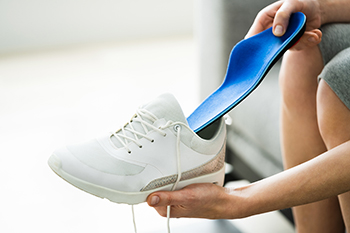
Medical devices that are placed inside the shoes for walking and running are referred to as orthotics. They are used to relieve pain from abnormal foot structures, or from having general discomfort while walking. There are several types of orthotics, and choosing the right ones depends on the condition they will be correcting. Patients who have corns and calluses may benefit from wearing epidermal insoles, which can be successful in removing pressure from the affected parts of the foot. People who desire to have a balanced distribution of weight on the feet may opt to wear comfort insoles that can absorb shock. Orthopedic insoles that are made of one piece may help patients that have flat feet, or additional specific types of deformities. If you have foot pain, and are interested in learning more about orthotics, it is suggested that you speak with a podiatrist who can determine which type is correct for you.
If you are having discomfort in your feet and would like to try orthotics, contact Dr. Kenneth Donovan from Advanced Care Foot and Ankle. Our doctor can provide the care you need to keep you pain-free and on your feet.
What Are Orthotics?
Orthotics are inserts you can place into your shoes to help with a variety of foot problems such as flat feet or foot pain. Orthotics provide relief and comfort for minor foot and heel pain but can’t correct serious biomechanical problems in your feet.
Over-the-Counter Inserts
Orthotics come in a wide variety of over-the-counter inserts that are used to treat foot pain, heel pain, and minor problems. For example, arch supports can be inserted into your shoes to help correct overarched or flat feet, while gel insoles are often used because they provide comfort and relief from foot and heel pain by alleviating pressure.
Prescription Orthotics
If over-the-counter inserts don’t work for you or if you have a more severe foot concern, it is possible to have your podiatrist prescribe custom orthotics. These high-quality inserts are designed to treat problems such as abnormal motion, plantar fasciitis, and severe forms of heel pain. They can even be used to help patients suffering from diabetes by treating foot ulcers and painful calluses and are usually molded to your feet individually, which allows them to provide full support and comfort.
If you are experiencing minor to severe foot or heel pain, it’s recommended to speak with your podiatrist about the possibilities of using orthotics. A podiatrist can determine which type of orthotic is right for you and allow you to take the first steps towards being pain-free.
If you have any questions please contact one of our offices located in Warren, Livingston, and Toms River, NJ . We offer the newest diagnostic and treatment technologies for all your foot and ankle needs.
Do Your Child's Feet Hurt?
Symptoms of an Achilles Tendon Injury
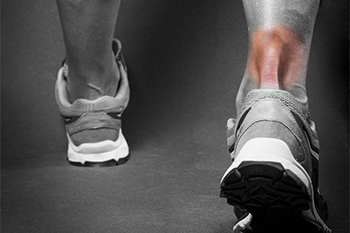
The most common reason an Achilles tendon injury can happen is overuse. Many runners experience this type of injury, possibly as a result of increasing speed and distance too quickly. Additionally, it may happen from not stretching properly before running or jogging. The Achilles tendon is located in the lower calf area and connects the heel to the calf muscles. This type of injury generally causes severe pain and discomfort and can be challenging to walk. Additional symptoms associated with an Achilles tendon injury can include stiffness, swelling, and a burning sensation. An Achilles tendon injury may cause some patients to feel weak and existing calluses on their feet may change in size. This may be a result of the impact an Achilles tendon injury can have on the skin while walking. If you have incurred this type of injury, it is strongly suggested that you consult with a podiatrist as quickly as possible who can guide you toward the right treatment methods.
Achilles tendon injuries need immediate attention to avoid future complications. If you have any concerns, contact Dr. Kenneth Donovan of Advanced Care Foot and Ankle. Our doctor can provide the care you need to keep you pain-free and on your feet.
What Is the Achilles Tendon?
The Achilles tendon is a tendon that connects the lower leg muscles and calf to the heel of the foot. It is the strongest tendon in the human body and is essential for making movement possible. Because this tendon is such an integral part of the body, any injuries to it can create immense difficulties and should immediately be presented to a doctor.
What Are the Symptoms of an Achilles Tendon Injury?
There are various types of injuries that can affect the Achilles tendon. The two most common injuries are Achilles tendinitis and ruptures of the tendon.
Achilles Tendinitis Symptoms
- Inflammation
- Dull to severe pain
- Increased blood flow to the tendon
- Thickening of the tendon
Rupture Symptoms
- Extreme pain and swelling in the foot
- Total immobility
Treatment and Prevention
Achilles tendon injuries are diagnosed by a thorough physical evaluation, which can include an MRI. Treatment involves rest, physical therapy, and in some cases, surgery. However, various preventative measures can be taken to avoid these injuries, such as:
- Thorough stretching of the tendon before and after exercise
- Strengthening exercises like calf raises, squats, leg curls, leg extensions, leg raises, lunges, and leg presses
If you have any questions please feel free to contact one of our offices located in Warren, Livingston, and Toms River, NJ . We offer the newest diagnostic tools and technology to treat your foot and ankle needs.
Symptoms of a Heel Spur
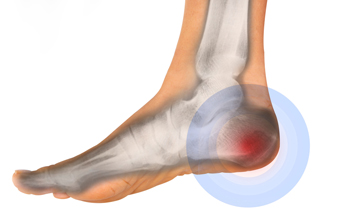
There are some people who have heel pain, and it may be caused by a heel spur. It is defined as a bony growth that forms on the bottom of the heel bone, and it can feel like a thorn in the foot. It generally forms at the point where the Achilles tendon connects to the back of the heel bone. A heel spur can happen from putting excessive strain on the foot. It can measure up to a half inch in length, and can become inflamed. Having an X-ray taken can be successful in determining if a heel spur exists. This is often performed after confirming symptoms, which may include increased pain while walking and avoiding any weight on the heel. Many patients walk on their tiptoes and find their pain is reduced while sitting down. Additionally, it may hurt when it is pressed on, and these symptoms may indicate medical attention is needed for relief. If you have heel pain, it is suggested that you speak with a podiatrist who can confirm a heel spur diagnosis and offer correct treatment solutions.
Heel spurs can be incredibly painful and sometimes may make you unable to participate in physical activities. To get medical care for your heel spurs, contact Dr. Kenneth Donovan from Advanced Care Foot and Ankle. Our doctor will do everything possible to treat your condition.
Heels Spurs
Heel spurs are formed by calcium deposits on the back of the foot where the heel is. This can also be caused by small fragments of bone breaking off one section of the foot, attaching onto the back of the foot. Heel spurs can also be bone growth on the back of the foot and may grow in the direction of the arch of the foot.
Older individuals usually suffer from heel spurs and pain sometimes intensifies with age. One of the main condition's spurs are related to is plantar fasciitis.
Pain
The pain associated with spurs is often because of weight placed on the feet. When someone is walking, their entire weight is concentrated on the feet. Bone spurs then have the tendency to affect other bones and tissues around the foot. As the pain continues, the feet will become tender and sensitive over time.
Treatments
There are many ways to treat heel spurs. If one is suffering from heel spurs in conjunction with pain, there are several methods for healing. Medication, surgery, and herbal care are some options.
If you have any questions feel free to contact one of our offices located in Warren, Livingston, and Toms River, NJ . We offer the latest in diagnostic and treatment technology to meet your needs.
Elderly Shoe Shopping
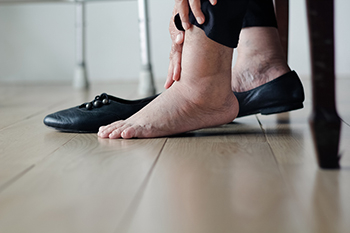
As an individual progresses into their elderly years, it becomes increasingly important for them to take extra care of their feet. This is because the feet can become more susceptible to foot conditions with age. One important part of maintaining foot health is wearing shoes that fit properly. When an elderly individual goes shoe shopping, there are several things they may consider doing to select the best fitting shoe. For example, as an individual gets older, it can be more difficult to bend over and put on shoes. So a senior may consider shopping for shoes that are easy to put on and take off. Additionally, since older people may slip and fall, shopping for shoes which have grips can be beneficial. If you are a senior or are caring for one, it is suggested that you schedule an appointment with a podiatrist today for more information.
Proper foot care is something many older adults forget to consider. If you have any concerns about your feet and ankles, contact Dr. Kenneth Donovan from Advanced Care Foot and Ankle. Our doctor can provide the care you need to keep you pain-free and on your feet.
The Elderly and Their Feet
As we age we start to notice many changes in our body, but the elder population may not notice them right away. Medical conditions may prevent the elderly to take notice of their foot health right away. Poor vision is a lead contributor to not taking action for the elderly.
Common Conditions
- Neuropathy – can reduce feeling in the feet and can hide many life-threatening medical conditions.
- Reduced flexibility – prevents the ability of proper toenail trimming, and foot cleaning. If left untreated, it may lead to further medical issues.
- Foot sores – amongst the older population can be serious before they are discovered. Some of the problematic conditions they may face are:
- Gouging toenails affecting nearby toe
- Shoes that don’t fit properly
- Pressure sores
- Loss of circulation in legs & feet
- Edema & swelling of feet and ankles
Susceptible Infections
Diabetes and poor circulation can cause general loss of sensitivity over the years, turning a simple cut into a serious issue.
If you have any questions please feel free to contact one of our offices located in Warren, Livingston, and Toms River, NJ . We offer the newest diagnostic and treatment technologies for all your foot and ankle needs.
Wounds That Don't Heal Need to Be Checked
Simple Steps for Diabetic Foot Care
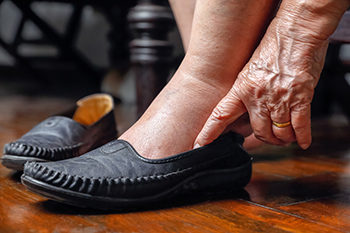
The feet are often affected in diabetic patients. People who have this condition may be unable to feel existing cuts or scrapes on their feet, as a result of possible nerve damage. It is important that people who have diabetes maintain a good foot care routine, and this can begin with washing and drying the feet. It is beneficial to use a mirror to check the soles of the feet for any cuts, and a caregiver or family member may help to accomplish this. Diabetes occurs as a result of elevated glucose levels in the blood, and it is helpful to monitor foods that are eaten that can affect these sugar levels. When the toenails are properly trimmed weekly, the chances of getting an ingrown toenail may be reduced. It is urged to refrain from walking barefoot, which can help to protect the skin on the feet. If you have diabetes, it is strongly suggested that you are under the care of a podiatrist who can provide you with helpful management tips.
Diabetic foot care is important in preventing foot ailments such as ulcers. If you are suffering from diabetes or have any other concerns about your feet, contact Dr. Kenneth Donovan from Advanced Care Foot and Ankle. Our doctor can provide the care you need to keep you pain-free and on your feet.
Diabetic Foot Care
Diabetes affects millions of people every year. The condition can damage blood vessels in many parts of the body, especially the feet. Because of this, taking care of your feet is essential if you have diabetes, and having a podiatrist help monitor your foot health is highly recommended.
The Importance of Caring for Your Feet
- Routinely inspect your feet for bruises or sores.
- Wear socks that fit your feet comfortably.
- Wear comfortable shoes that provide adequate support.
Patients with diabetes should have their doctor monitor their blood levels, as blood sugar levels play such a huge role in diabetic care. Monitoring these levels on a regular basis is highly advised.
It is always best to inform your healthcare professional of any concerns you may have regarding your feet, especially for diabetic patients. Early treatment and routine foot examinations are keys to maintaining proper health, especially because severe complications can arise if proper treatment is not applied.
If you have any questions please feel free to contact one of our offices located in Warren, Livingston, and Toms River, NJ . We offer the newest diagnostic and treatment technologies for all your foot and ankle needs.


